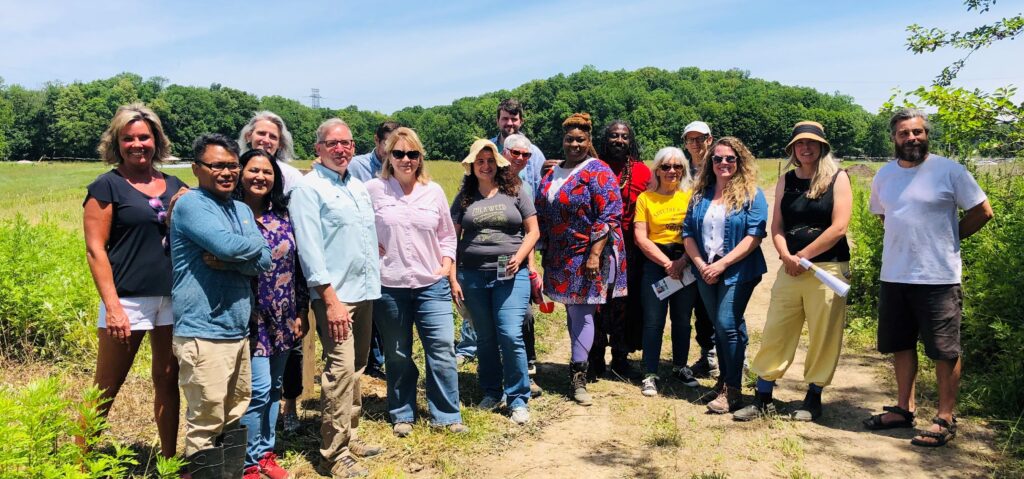The State We're In
A helping hand for farmers without land
Farmers starting out in the Garden State face a conundrum. On one hand, New Jersey has preserved 33 percent of its farmland and secured the protection of thousands of acres of fertile farms and soil. Yet, this state we’re in has the nation’s second most expensive farmland, putting land ownership out of reach for many would-be farm entrepreneurs.
Leasing farmland is often touted as an alternative, but traditional leases have drawbacks. “In most of the state, farmers have one-year leases, and many of those are based on a handshake,” explained Eric Derby of the Foodshed Alliance, a Warren County-based nonprofit. Many farmers with informal, short-term leases don’t feel confident enough to invest in infrastructure like wells, equipment and electricity.
The Foodshed Alliance, which promotes a rural economy centered on producing and selling local foods, has come up with an innovative solution. It’s called the Sustainable Agriculture Enterprise program, or SAgE for short, and it provides affordable 10-year, renewable farmland leases to farmers who pledge to use organic practices.
“With 10-year leases, farmers can invest in their businesses without having to worry about losing their land,” said Eric, the SAgE program manager. Now in its second year, the SAgE program is currently leasing land to 10 farmers from diverse backgrounds.
The program got a boost this summer when the Foodshed Alliance acquired 333 preserved acres in Andover and Fredon townships in Sussex County. The Ridge and Valley Conservancy, a Blairstown-based land trust, transferred the property to the Foodshed Alliance on July 28 as part of an agreement worked out years earlier.
“We’re very happy,” said Eric. “It certainly was a milestone for us, and it gives you a pride in ownership.”
All available plots at the property, called Muckshaw Farm, are now leased out by farmers who are committed to sustainable farming practices that make a minimal impact on natural resources, ecosystems and biodiversity.
Farms located at Muckshaw include:
- Sussex County Community College Student Farm – a learning farm providing hands-on experience to future farmers.
- Dark Earth Farm – a biodynamic farm growing hemp and vegetables using permaculture and regenerative practices to improve soil health.
- Munsee Three Sisters Medicinal Farm – a Ramapough Lenape Native American farm cultivating hemp, vegetables, garlic, and heritage and ancestral crops.
- Seek-No-Further Fruit Farm – an organic orchard and berry farm.
- Sunset View Veggies and Berries – a vegetable and berry farm using permaculture design practices.
- Lionshead Bee Farm – This farm produces honey and beeswax products while pollinating neighboring SAgE farms.
- USA Agro Farm – a goat farm whose owner brings experience working on his family farm in Nepal.
- Growin’ Folx Farm – a first-generation family-owned, minority, 50 percent women owned/operated vegetable farm.
- All Things Good Gardens – a woman-owned medicinal and culinary herb and flower farm, focused on making medicinal products for healing.
SAgE has another farm site in Warren County, where it leases five acres to Bread Lock Botanicals, a woman-owned and operated organic flower, vegetable and herb farm.
The Muckshaw site has a long history. At the height of the development boom of the 1980s, the land was proposed for housing. For two decades, The Nature Conservancy worked with the New Jersey Green Acres Program and the State Agriculture Development Committee to negotiate with landowners and secure funding to permanently protect the land. The site was preserved in 2003 as open space and farmland.
For many years, The Nature Conservancy managed the natural habitats and hiking trails, and leased the fields to local farmers. In early 2020, The Nature Conservancy transferred the property to the Ridge and Valley Conservancy, an agreement that included leasing and eventually transferring the farm portion to the Foodshed Alliance.
The Foodshed Alliance now owns the 333-acre Muckshaw Farm, which includes 66 farmable acres. The Ridge and Valley Conservancy kept the remaining 201 acres as a nature preserve called Muckshaw Ponds. The site features limestone-rich, interconnected ponds that are home to rare and endangered plants.
The SAgE program is a great addition to efforts pioneered by the New Jersey chapter of the Northeast Organic Farming Association (NOFA-NJ) to encourage more farmers to use organic methods, and to teach new farmers the essentials of running their own business.
The average age of farmers in New Jersey is 60, with a resultant desperate need to nurture the next generation of food growers. The Foodshed Alliance is actively looking to expand the SAgE program by identifying additional farmland leasing opportunities throughout the state.
Working with urban agriculture partner organizations, the Foodshed Alliance is also expanding outreach efforts to engage Black, Indigenous and people of color (BIPOC) and socially disadvantaged communities.
To learn more about the Foodshed Alliance and the SAgE program, go to https://foodshedalliance.org/.
For more information about the Northeast Organic Farming Association and its beginner farmer program, go to https://nofanj.org/.
And for more information about preserving New Jersey’s land and natural resources, visit the New Jersey Conservation Foundation website at www.njconservation.org or contact me at info@njconservation.org.
About the Authors
Alison Mitchell
Co-Executive Director
John S. Watson, Jr.
Co-Executive Director
Tom Gilbert
Co-Executive Director, 2022-2023
Michele S. Byers
Executive Director, 1999-2021
View their full bios here.
Filter
Get The Latest News
From The Garden State
In the
News

